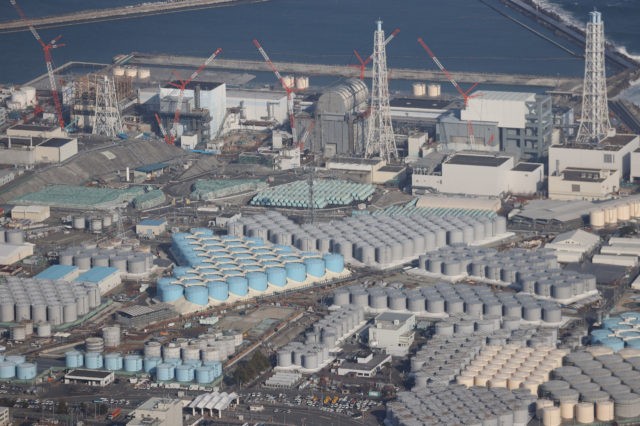Tokyo cannot delay plans to release 1.25 million tons of contaminated water from the Fukushima nuclear plant into the Pacific Ocean starting in 2023 because such a setback would foil Japan’s goal of decommissioning Fukushima’s nuclear reactor, Japanese Prime Minister Kishida Fumio said on Sunday.
“I felt strongly that the water issue is a crucial one that should not be pushed back,” Kishida told reporters after visiting the Fukushima Daiichi plant in person on October 17.
Executives of the Tokyo Electric Power Company Holdings Inc. (TEPCO) showed Kishida around the nuclear facility on Sunday so that he could “inspect progress in decommissioning it,” Japan’s Kyodo News reported.
Kishida told TEPCO executives, who operate Fukushima Daiichi, that decommissioning the plant is a “prerequisite for reconstruction” of Japan’s northeastern region. The area was devastated by a series of catastrophic events in March 2011, starting with a magnitude 9.0 earthquake. The earthquake caused a tsunami along the northeast coast of Japan which struck Fukushima, causing the prefecture’s nuclear plant to suffer a severe meltdown.
Japanese authorities used more than one million tons of water to cool the plant’s affected reactors in the immediate aftermath of the crisis. They subsequently chose to store the radioactive water in above-ground tanks on Fukushima’s premises. The tanks additionally contain rainwater and groundwater contaminated by the meltdown.
After deliberating for years on how to best dispose of the wastewater, Japan’s government decided on April 13 to release the tanks into the nearby Pacific Ocean. The water will be dumped into the ocean after being treated through an Advanced Liquid Processing System (ALPS), which is designed to remove most of the water’s radioactive material.
“The [ALPS] process removes most radioactive materials including strontium and cesium but leaves behind tritium, which is related to hydrogen,” Kyodo News noted in April.
“According to the government’s plan, the tritium will be diluted to less than 1,500 becquerels per liter, one-40th of the concentration permitted under Japanese safety standards and one-seventh of the World Health Organization’s guideline for drinking water,” the Japanese news outlet reported at the time.
The Citizens’ Commission on Nuclear Energy (CCNE), an independent research body established in Japan in the wake of the 2011 Fukushima nuclear disaster, told Kyodo News on April 13 it was concerned about Tokyo’s plan to release the water after treating it through ALPS only.
CCNE noted that there is a lack of a “uniform international standard on a level of tritium deemed safe for release into the environment.”
“Japan sets the level at 60,000 becquerels per liter, while the World Health Organization says the acceptable level is 10,000 becquerels per liter and the European Union 100 becquerels per liter,” CCNE member Masashi Goto said.
“Such significant differences in the standards across countries prove that there is no scientific foundation for the safety of tritium,” he concluded, adding “many countries have merely set standards because they needed to run nuclear power plants, which produce tritium as a byproduct.”
Kishida was elected prime minister of Japan just two weeks ago on October 4. His predecessor, Suga Yoshihide, approved Tokyo’s final plans to release Fukushima’s wastewater into the Pacific Ocean in the spring, so Kishida’s backing of the action seems to confirm that his administration will see the project through to completion. The water’s release is expected to start in 2023 and last for an additional year or two.
South Korea has previously expressed disapproval of Japan’s wastewater disposal plan, citing fears that dumping the radioactive water into the shared Pacific Ocean could impact the safety of neighboring countries. Seoul reiterated its opposition to the plan on October 17 shortly after Kishida publicly backed the proposal.
“Japan’s decision (to discharge the wastewater) was made without enough consultations with the neighboring nations,” a senior South Korean foreign ministry official said, as quoted by Yonhap News Agency.
“We have expressed serious concerns and opposition to its plan, which could affect our people’s health and security as well as the ocean environment,” the unnamed official added.

COMMENTS
Please let us know if you're having issues with commenting.